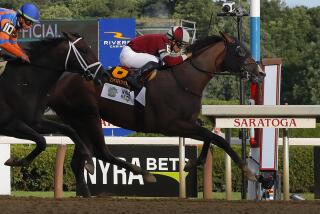Confusion Hampers Unbridled’s Song
Unbridled’s Song never really had a chance in this year’s Triple Crown. Sure, he was his worst enemy--a nervous, incredibly fast horse who wouldn’t relax--but worse still, some of those same adjectives apply to his handlers, who have mismanaged him into limbo.
In another barn, one grounded with seasoned horsemen savvy about campaigning an important horse, Unbridled’s Song might still be a factor. Instead, with the Belmont Stakes, the Triple Crown windup, still to be run a week from Saturday, Unbridled’s Song has been virtually forgotten, sidelined until late summer because of a lung infection.
Getting to and then surviving the Triple Crown races has never been a walk in the park. Grindstone, the Kentucky Derby winner, has been retired. Blow Out, the seventh-place finisher in the Derby, is dead. So is Gomtuu, the Canadian champion.
Seven horses from the Derby, a high number, moved on to the Preakness. A handful from the Preakness, including the winner, Louis Quatorze, may try again in the 1 1/2-mile Belmont, but the pizazz was knocked out of this year’s tournament when the Derby winner left the mix and then Unbridled’s Song, fifth as the favorite in the Derby and arguably the best 3-year-old out there, came up with his latest problem.
Unbridled’s Song’s camp--owner Ernie Paragallo, his aide-de-camp, Buzz Chace, and trainer Jim Ryerson--was a vacillating bunch even when the horse was a 2-year-old, and the bigger the races got, the more it dithered. If you questioned those three guys on any given day, you never got the same answer from any of them.
Ryerson, who has been around the racetrack for a quarter of a century, is a decent sort who has been caught in a vise, trapped by a know-it-all owner and Chace, a career racetracker who, like Ryerson, gets 10% of whatever Unbridled’s Song earns. This winter, after the Breeders’ Cup Juvenile winner ran second twice as an odds-on choice, rumors were swirling at Gulfstream Park that Ryerson would be sacked. After all, he doesn’t train that many of Paragallo’s horses, anyway. Instead, his role has evolved into little more than a caretaker for the horse. It would be no surprise if Unbridled’s Song had a new trainer the next time he runs.
The gray colt’s problems began with his win in the Wood Memorial, which left him with a cracked hoof. Two weeks went by before anyone outside the immediate family noticed, and when Paragallo blew into Louisville several days before the Kentucky Derby, he chided reporters for not catching on sooner. The next turf writer who checks the bottom of a horse’s feet goes into the Hall of Fame.
On a day-to-day basis at Churchill Downs, a blacksmith changed Unbridled’s Song’s shoes, then Paragallo woke up one morning and got a surprise of his own. When he got to the track, he was the last to know that his horse, out early, had worked hard instead of merely galloping around the oval.
Unbridled’s Song worked way too fast, and when he drew the outside post in a 19-horse field, his camp should have had enough reasons to scratch. The real tip-off came from Neil Drysdale, a trainer who didn’t have a horse in the race, but who had been forced to scratch A.P. Indy, one of the favorites, on the morning of the 1992 Derby. A.P. Indy also had a cracked hoof.
“All I know,” Drysdale said before this year’s Derby, “is that I was told a long time ago that you never run a horse in a bar shoe at Churchill Downs.”
Tomonori Tsurumaki, the Japanese industrialist, had flown all night from Tokyo to watch his A.P. Indy run in the Derby, and for some owners that would have been reason enough to keep a horse in a race.
“But Mr. Tsurumaki is a horseman in his own right,” Drysdale said. “He understood the problem. He had no trouble with the decision not to run the horse.”
Drysdale kept A.P. Indy at Churchill Downs for several days, fooling with the injured hoof. With the bursting of Arazi’s bubble in the Derby, the Preakness must have looked like easy pickings, but Drysdale resisted running at Pimlico too. Using the Peter Pan for a prep, A.P. Indy was right for the Belmont, the springboard for a second-half campaign that produced horse-of-the-year honors.
After leading until the top of the stretch and then finishing fifth in the Derby, Unbridled’s Song was in and out of the Preakness. Then it was suggested his next race might be the Dwyer Stakes at Belmont Park, not until July 7. Then he was supposed to run in the Metropolitan Handicap. When he finally ran in the Peter Pan last Sunday, it was with a patched hoof and another shoe change. The horse that beat him, Jamies First Punch, had never beaten a really good horse.
In 1978, the year Affirmed swept the Triple Crown, his trainer, Laz Barrera, was roundly criticized for not running against Seattle Slew, the 1977 Triple Crown champion, in the Woodward Stakes.
“You know, there’s a trick to all this,” Patrice Wolfson, one of Affirmed’s owners, said later. “You tell everybody you’re going to run, and then when you don’t, you’re a poor sport. The trick is not to say anything. Then if you don’t run, nobody can be the wiser.”
Horse Racing Notes
If Cigar wins the Massachusetts Handicap at Suffolk Downs on Saturday, he’ll go over the $8-million mark in purses. One of the five horses running against him, Personal Merit, ran fourth in last year’s race, finishing almost 10 lengths behind Cigar. Personal Merit is winless in six starts since then. There will be no place or show betting on the Suffolk race. . . . Besides Honour And Glory, trainer Wayne Lukas is pointing another horse toward the Breeders’ Cup Sprint in October. Lord Carson equaled the track record for six furlongs at Churchill Downs last week when he hit the wire in 1:08 3/5. Earlier, Lord Carson set a track record at Turfway Park with a 1:08 3/5 clocking. If Lukas can successfully shorten up Honour And Glory, he will be providing a sequel to Gulch, who won the 1988 Breeders’ Cup Sprint after running in the Classic the year before. “It’s a myth that it’s harder to convert a horse back into sprinting,” Lukas said. “That’s the easiest thing. The hardest thing is to get a sprinter to run long. A horse who’s been good going short doesn’t forget how he’s done it.”
More to Read
Go beyond the scoreboard
Get the latest on L.A.'s teams in the daily Sports Report newsletter.
You may occasionally receive promotional content from the Los Angeles Times.










